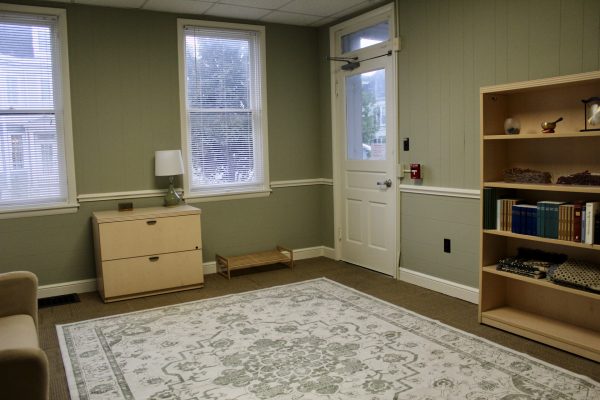Student Senate Hosts Forum on Inclusivity
On Feb. 18, Student Senate and the directors of the Office of Equity and Inclusivity, formerly the Landis Collective, hosted an open forum to discuss their resources and answer questions. The Office of Equity and Inclusivity includes the Center for Spirituality & Social Justice (CSSJ), Asbell Center for Jewish Life, Office of LGBTQ Services, Popel Shaw Center for Race & Ethnicity (PSC) and Women’s & Gender Resource Center (WGRC). Each office was represented by its director.
Director of the PSC Vincent Stephens started the open forum and questioned the audience on how many words that were applicable to the specific offices (such as interfaith, cisgender, anti-racist, etc.) they could recognize and explain to another person.
Stephens, Director of WGRC, Donna Hughes, Interim Director of the Office of LGBTQ Services, Anne-Marie Stewart and Director of the Asbell Center for Jewish Life, Rabbi Marley Weiner, who was also there on behalf of Donna Bickford, director of WGRC, introduced their offices and discussed their mission statements, the role of their student workers, their roles on campus and opportunities for student engagement.
Stephens explained that the mission of the PSC is changing, as they are trying to connect and provide support and resources not only for students, but for faculty and staff. PSC has recently moved and is no longer part of the Office of Student Life and Campus Engagement (SCLE), which allows the office to focus on faculty, staff and students. Stephens explained that the student engagement opportunities provided by PSC are A.C.E. Peer Mentors, B.E.R.T, Cultural and Educational Programming, MANdatory and the multicultural mixer series, among others.
Weiner presented on CSSJ, which includes Jewish life, which Weiner oversees. She explained that their message is also currently being changed, as Bickford and Weiner see their work as being for everyone, and not just those who practice a particular faith. “Faith is a […] lifelong support for people,” Weiner said, “What we don’t do is the bigger question.” The student engagement opportunities provided by CSSJ are the Faith and… series, What Matters Most Dinners, the Good Life Retreat, the Wesley Lecture Series, among others.
Bickford then introduced the WRGC and discussed the signature programs which include a Latina discussion group, Witness the Power, Love Your Body Week, Gender Week, Take Back the Night and a womxn’s retreat at the college farm, among others.
Stewart presented on the office of LGBTQ services, and discussed signature programs such as Dinealouge, film screenings, Out on Britton, the Lavender Reception, RAISE training and Transgender day of remembrance, among others.
Bickford then discussed their collaborative programs, explaining that the offices work together and that “there is a lot of crossovers.” Some of their collaborative programs include Landis Listens and co-sponsored campus lectures.
They then allowed students to ask questions.
The first question pertained to the Office of Equity and Inclusivity’s role in responding to the student protests. Bickford explained that they met with students individually to discuss matters such as activism and ways to cope. Bickford said that she held her senior seminar in the HUB because her students said they were not leaving.
Stephens explained that the PSC used its Facebook page as a way to convey information. “24 liberal arts colleges responded to Trump’s Title IX proposal and Dickinson was one of them,” he said and explained that not a lot of people knew about it, so the center shared it on their Facebook page.
“This is not the first time that a college has had to grapple with a challenging […] issue, and it is not the last time,” Weiner explained. She continued and said that her goal is of pastoral accompaniment and to show students how spiritual work can fuel movements such as protests, so it will not wear out.
Each of the directors explained that they attempted to provide resources, information and guidance during the protests to feel as though students were supported and had people to rely on. Bickford explained that students have been the priority of the offices the past few weeks, and being there to listen has been one of their main goals.
The directors called for student senate to hold people accountable as a representative body after the protests.
Next, Stephens discussed Black Excellence Week and his frustration will students being scared of being in spaces that they do not normally occupy. “Oftentimes what I find is that white students are afraid to cross certain barriers […] these events are not just for one type of person,” Stephens said, “I’m trying to understand what the fear is.”
Weiner also addressed the topic of being in a space you do not typically occupy. She continued, and explained that you may never be in a space where there are so many people who are so different from you ever again. “It is a learning skill, and college is a place where you learn how to do it,” Weiner said, “Most things in life are practices […] there’s the practice of boldness and bravery […] the practice of trying something out of our comfort zone.”
Bickford said, “Everyone wants to be in a group with likeminded people,” but echoed the sentiments of Stephens and Weiner and urged students to try to do things and learn about things outside of their comfort zones.
An audience member then questioned the role of interfaith work at college. Weiner responded, and explained that it is “a number of things, you don’t have to believe in any particular religion to come to CSSJ […], one, college is the time where we develop our central values […], also for many people it may be the first time you’ve met someone different than you […] as a society we are becoming less and less affiliated.”
Only about four non-student senators attended this event.



